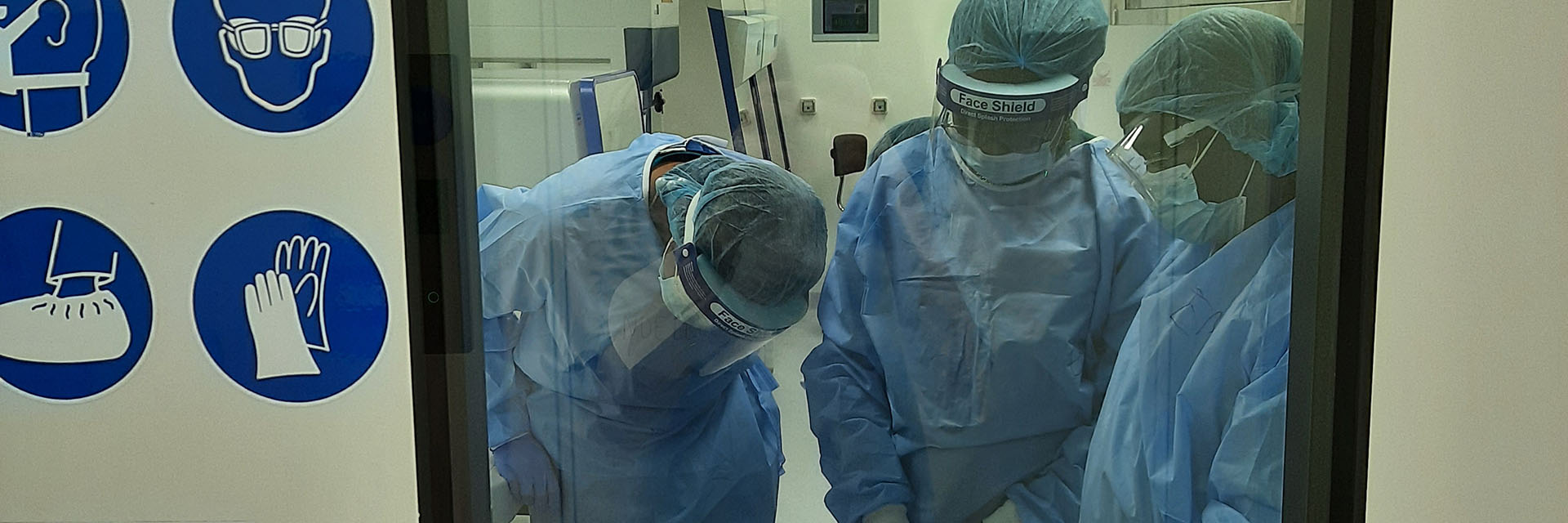It is equipped with advanced technologies that comply with the most stringent international quality, biosafety and biosecurity standards.

Through this laboratory, USAID, the Mérieux Foundation and the Mérieux Foundation USA are working with the INRB to provide the DRC with vital decentralized testing capacity for the control and surveillance of infectious disease outbreaks with epidemic potential.
The laboratory is also part of the GABRIEL network, aiming to promote the exchange of information, experience and skills to help establish surveillance programmes, clinical research and epidemiological studies that improve the diagnosis, prevention and treatment of infectious diseases.
Fighting against the Ebola Virus Disease
In July, 2019, Professor Jean-Jacques Muyembe Tamfum, Director of the National Institute of Biomedical Research (INRB), alerted the President of the Mérieux Foundation, Alain Mérieux, about an urgent need to increase diagnostic testing capacity to combat the worst Ebola epidemic in the country’s history, and the world’s second largest outbreak on record. Prof. Muyembe was in charge of the national response to the outbreak and was alarmed to see the first cases of Ebola Virus Disease emerging in Goma, the country’s third largest city and a major gateway for trade with bordering Uganda and Rwanda.
The Mérieux Foundation responded rapidly, and by October 2019, airlifted container laboratories to the DRC. Ownership of the infrastructure was given to the provincial branch of the INRB, based in Goma.
In November 2019, USAID signed a cooperative agreement with the Mérieux Foundation USA to co-fund this project for a new Rodolphe Mérieux Laboratory.
Strategic location to fight against outbreaks
The DRC is one of five African nations that maintain an international reference laboratory for viral hemorrhagic fevers and emerging diseases. The INRB, headquartered in Kinshasa, is an internationally recognized reference laboratory for Ebola and other viral hemorrhagic fevers. The development of reference laboratories in other parts of the country is essential due to the DRC’s immense size. Eastern DRC is particularly strategic since more than half of Ebola outbreaks have occurred there over the past 40 years and laboratory infrastructure is very limited.
The aim of the infrastructure is to establish:
- A permanent reference laboratory for viral hemorrhagic fevers, such as Ebola Virus Disease, and other emerging diseases
- A secure facility for storing specimens from outbreaks
- An operations center for INRB outbreak response teams permanently based in Goma to enable rapid investigation of future outbreaks
Key role in the fight against COVID-19
The year 2020 was marked by the health crisis related to COVID-19 and confirmed the strategic importance of this laboratory to respond to various epidemic crises.
The laboratory plays a critical role in the COVID-19 pandemic response, performing all the testing for the eastern region of the country. In the second half of 2020, approximately 7,000 COVID-19 tests were performed in the Goma laboratories.
Infrastructure
The Mérieux Foundation asked the Grenoble-based company, IMeBIO, to outfit shipping containers with “plug & play” laboratories, specially designed for deployment in limited resource settings: robust, easy to transport and with minimal energy consumption.
The Rodolphe Mérieux Laboratory at INRB is equipped with:
- A biosafety level 2 (BSL2) laboratory in a container: equipment includes platforms for performing molecular diagnostic testing and biosafety level 2 cabinets
- A biosafety level 3 (BSL3) laboratory in a container: equipment includes biosafety level 2 and 3 cabinets, an advanced diagnostic instrument for clinical chemistry, and equipment for sterilization and decontamination
- A cold storage refrigerated containerfor specimens and reagents
- Offices, meeting rooms and break areas for the staff and visiting scientists
A dozen people work at the lab, led by Dr. Daniel Mukadi, Director of the Rodolphe Mérieux Laboratory and Provincial Director of the National Institute of Biomedical Research (INRB) in Goma.
Training
Mérieux Foundation experts trained the Rodolphe Mérieux Laboratory personnel on using specialized equipment as well as biosafety, biosecurity and operations protocols.
Developing Standard Operating Procedures (SOPs)
Procedures for operating and maintaining the facilities were developed with support from the Mérieux Foundation, for topics such as biosafety, biosecurity, and waste management.
What’s next?
The laboratory will be integrated into the regional health system as a reference laboratory for viral hemorrhagic fevers and other emerging infectious diseases. It will perform surveillance activities and respond to future outbreaks.

